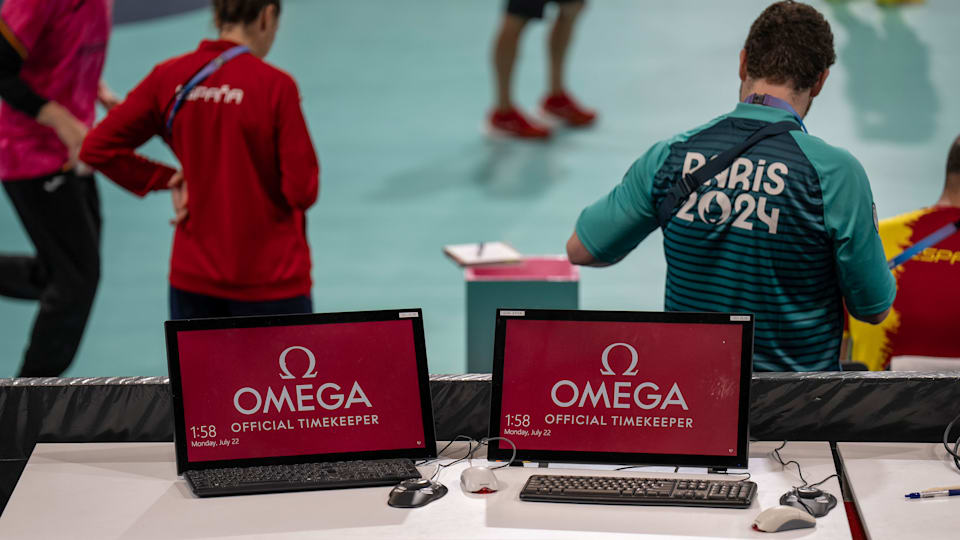OMEGA’s latest innovations providing more insights for Olympic fans than ever before
Viewers from around the world are gaining greater insights into exactly how athletes are performing at the Olympic Games Paris 2024 thanks to new technology from Worldwide Olympic Partner OMEGA.

As the Official Timekeeper for the Olympic Games, OMEGA is delivering timing and scoring services for all 329 Olympic events in Paris across 32 sports, and has introduced several innovations to provide audiences with more in-depth data than ever before.
“OMEGA's always been a pioneer in its history as Official Timekeeper at the Olympic Games,” explains Alain Zobrist, CEO of OMEGA Timing.
Here in Paris, we obviously have a lot of innovations. We're very excited about these technologies because they allow us to really tell the full story of an athlete's performance and explain their results in much greater detail, understanding where they gained or lost time or points. This is fascinating as we can also distribute and share that information with wider audiences, working closely with Olympic Broadcasting Services to show these technologies on screen through dedicated graphics.
These innovations for Paris 2024 include OMEGA’s cutting-edge Computer Vision systems, which can accurately track athletes and other objects to record various performance metrics. For beach volleyball, this includes the distances covered by each player, the speed of the players and the ball, the unique player techniques, including jump heights, and the type of shots, from smashes to blocks and spikes.
Live data for in-depth analysis
Unlike previous systems, athletes are no longer required to wear sensors within their uniforms to record these metrics. Instead, all of OMEGA’s data is being captured by high-definition cameras that are installed around the field of play, each feeding artificial intelligence (AI) models that are specifically trained for each sport. This live data is allowing for in-depth analysis of each event, helping broadcasters tell the comprehensive story of how it was won or lost, and the critical moments that led to an athlete’s final result.
In addition to beach volleyball, the Computer Vision system is being used in aquatics events to track divers from the moment they begin their dive to their entry into the water, reproducing a 3D graphic of the dive with metrics such as airtime and speed.
In tennis, meanwhile, Computer Vision is measuring the reaction time of each returned serve, while in gymnastics it is being used to reveal the height and airtime of the skills being performed in the floor routines. Thanks to AI-based skeleton tracking, even the angles of an athlete’s feet can be detected, providing in-depth analysis during each rotation.
Greater insights will also be available in the pole vault, with the gap between the athlete and the bar being automatically measured for the first time at the Olympic Games, highlighting how much space was left during a successful vault.
The timekeeping operation
In order to measure every event with unrivalled accuracy, OMEGA’s timekeeping operation for Paris 2024 uses state-of-the-art equipment, including not only the technology used to measure the results, but also the public scoreboards and sport-specific scoreboards that are found in every venue.
In addition to the Computer Vision systems, this equipment includes electronic photocells, starting blocks and starting pistols, as well as the brand new Scan‘O’Vision ULTIMATE photo finish camera, which can record 40,000 digital images per second on the finish line of races. This improved version is being used at the Olympic Games for the first time and replaces the former Scan‘O’Vision MYRIA, which was able to record 10,000 digital images per second.
A lasting partnership
Paris 2024 marks the latest milestone in OMEGA’s sporting journey, having served as the Official Timekeeper of the Olympic Games since 1932. The company became a Worldwide Olympic Partner by joining the TOP programme in 2004, with its Olympic partnership extending through to the Olympic and Paralympic Games Brisbane 2032.
“Sport, without a doubt, is part of OMEGA’s DNA,” says Zobrist. “Our partnership will soon reach 100 years, and that shows the trust not only between OMEGA and the IOC [International Olympic Committee], but also with the athletes. They are always our first clients. They're the ones who train their entire lives to participate at the Olympic Games, and they deserve an Official Timekeeper they can trust. Every result of every athlete participating in the Olympic Games is measured through systems provided by OMEGA, which shows how important the partnership is between us and the IOC.”